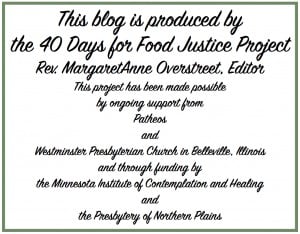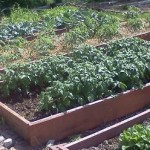I’ve been teaching classes and workshops about food – and the global implications of our daily food choices – for several years. Over the course of those teaching opportunities, I’ve discovered a pair of questions that really gets a lively discussion started.
The first question is: What are your values?
In other words, what are the ideals by which you live your life, by which you decide right or wrong, by which you choose to go left or right? This question evokes a variety of responses: compassion, equality, kindness, justice, respect for others, joy, connection, doing unto others as you would have them do unto you.
After some thoughtful conversation, I ask my second question: What are your food values?
In other words, what are the criteria by which you make your food choices, three times a day, every day? Again the responses are varied, but they are almost always very different than the answers to the first question: price, convenience, speed, pleasure, health.
As people of faith, we try to live by a moral compass, living a life that reflects our belief system. When we make our choices – great and small – with awareness and intention, those choices reflect our values. When we make choices with less awareness, sometimes almost unconsiously, our choices are less likely to reflect our values.
Like so many of us, much of my life has been spent eating unconsciously, making food choices with little or no awareness of the way my food choices affect my body, my brothers and sisters around the corner and around the world, or the planet. The road to more conscious eating, and to bringing my food values more in line with the values of my faith, has not been quick or easy.
But I believe the work of doing so is essential.
There are seven billion people on earth and they all need to eat. The food choices of all seven billion are connected to one another and they have cumulative effects on the environment, the farmer, the farmworker, food policy, and much more.
Wendell Berry wrote, “Eaters, that is, must understand that eating takes place inescapably in the world, that it is inescapably an agricultural act, and how we eat determines, to a considerable extent, how the world is used.”
I care about how the world is used. I care about those who grow and transport food. I care about those who do not have access to enough food or to healthy food choices. Those are my food values.
I have chosen to care about those things because my faith teaches me that God cares about those things, too.
Eating with ever-increasing awareness of the implications of my food choices, and with the intention to align my food choices with my food values, not only allows me to serve the cause of food justice, but also allows me to cooperate with God’s ongoing work in the world.
———————————-
Lenten Calendar for FEBRUARY 21
Open a cabinet and take out any 5 items of food. Read the labels. Donate a nickel for each ingredient that you don’t know what it is.
————————————
Sign up to receive the daily meditations by email, or like us on Facebook.
————————————
We need your stories!
We’re already looking ahead to the 40 Days for Food Justice Project for 2016 and we’re looking for more stories, experiences, prayers and resources about food justice and food injustice.
If you would like to contribute – or would like to recommend a contributor – please send us an email and let us know.
About:
In addition to being the founder and editor-in-chief of the “40 Days for Food Justice Project”, the Rev. MargaretAnne Overstreet is a mom, a Presbyterian pastor, and a certified Health Coach. She does ministry with and among the good people of Westminster Presbyterian Church in Belleville, Illinois, where she gets her hands dirty in the community garden and, every Sunday, preaches with bare feet. She treasures family time, relishes every opportunity to teach and write about food justice, and loves to play outside with her dogs. Find out more about her at www.AnInBetweenPlace.com













